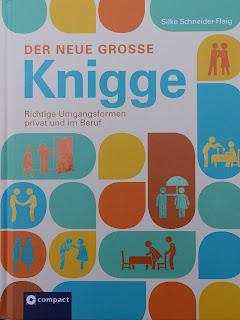I am so
damn sick of superficiality. Smartphones and Facebook & Co. have turned us into people who
don’t have time for real communication with each other because we’re too busy
playing games and scrolling through our feeds to see if we missed some
meaningless thing that we can “like” or “LOL” about. And talking with each
other about something deep and meaningful? Well, forget that. Small talk.
That’s safe and noncommittal. We don’t have to think if we stick to
small talk. “Hihowareyou?” Even German teens I spoke to recently knew before I
“warned” them that this isn’t actually a question and that there’s only one
correct answer to it in the U.S.: “Fine, thanks, how are you?” Don’t bother
with anything else.
In November
2014 a former German student of mine in Wisconsin – a really nice and funny kid
in my class and on my first trip with students to Germany in 2000, whom I
remember well – brutally attacked, tortured, and repeatedly stabbed a couple in Virginia
and is now serving two life sentences + 98 years. When the cops found him he
was wearing only an adult diaper and muttering in German. German he learned
from me, presumably.
Last
November a friend of mine here in our area allegedly murdered a close friend of
his – a wealthy German man who was very involved with helping local refugees.
M.O. is/was as friendly as an American – had a huge smile whenever he saw me or
anyone else, and had asked me to tutor him in English because he wanted to go
to the US someday. We never got around to that and weren’t closer friends only
due to lack of more effort on my part. I wrote a blog post about him after he’d
submitted a letter to the local newspaper about how grateful the Syrians were
for Germany’s welcome and help. I introduced my dad to him. We took photos.
I heard
about the crime when it was reported and a few days later learned from a mutual friend who the
alleged killer was. I did not believe it. I know him. I also did not believe it a few weeks later as more details emerged. It just didn’t compute. It still doesn’t.
He has been sitting in U-Haft since
November, accused of the crime. After months of investigation he and an
accomplice were officially charged recently and there will be a trial. I still remember and think of him as he was when I last saw him – same with my former student.
What’s my
point? I don’t know. Things happen. People snap and do horrible things. How do
you know your good friend (or, as in the case of my former student, the spouse
of an employee you fired) isn’t going to turn on you? How do you know anyone? You don't. I can count on one hand minus a few fingers the number of people who really know me and want to. That's ok. Maybe it's best that way.
But yeah… I
am done with superficial conversations and small talk. I’m done with
“Hihowareyou?”
What are you struggling with? What are you passionate about? What makes you tick? How can we make our relationship/friendship better? What do you need from me? What can I learn from you? Let’s talk about politics, gun laws, climate change, and religion. Let’s challenge each other! Let’s talk about why I annoy you.
What are you struggling with? What are you passionate about? What makes you tick? How can we make our relationship/friendship better? What do you need from me? What can I learn from you? Let’s talk about politics, gun laws, climate change, and religion. Let’s challenge each other! Let’s talk about why I annoy you.
Ha, never mind that last one. It’s probably because I can't stand small talk and
superficiality.




